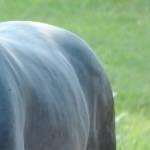Age, Obesity Alter Equine Intestinal Microbiome

We know the equine intestinal microbiome makes important contributions to the horse’s overall health. This population of microorganisms forms early in life and can change swiftly during times of stress and disease. The microbiome also can influence how much energy, or calories, is extracted from the horse’s diet, potentially contributing to obesity.
“Obesity has become a major welfare concern in the equine industry, with an increasing number of horses recognized as overweight, including older horses,” noted Laura Petroski-Rose, B.V.M.S., a Kentucky Equine Research veterinarian.
Each horse is different, and some easy keepers seem to grow fatter and fatter despite eating very little. Could their microbiome be to blame? To answer this question, 35 Welsh Mountain pony mares were followed for two years.* All mares were fed individually and offered a maintenance hay diet (i.e., 2% of body weight as dry matter intake). Feces was collected from these mares and analyzed to determine the composition of their intestinal microbiome (bacteria, protozoa, and fungi). Their age and body condition at time of sample collection were also noted.
As previously reported, the predominant bacterial types in all horses were Bacteroidetes, Firmicutes, and Fibrobacter.
“Noteworthy in this study was that older horses and obese horses each had different bacterial communities in their feces compared to their younger, thinner counterparts,” relayed Petroski-Rose.
Specifically, Proteobacteria were increased in older ponies, whereas Bacteroidetes, Firmicutes, and Actinobacteria were increased in obese animals. In fact, the researchers found that over 500 bacterial groups differed significantly between horses based on age and body condition.
She added, “The researchers clearly indicated that age, but especially obesity, have major effects on the composition of the intestinal microbiome.”
Support your horse’s intestinal microbiome to maximize his overall health and longevity. Consult a Kentucky Equine Research nutrition advisor for help.
“Kentucky Equine Research also offers several nutritional supplements designed specifically for buffering the stomach and hindgut to provide a suitable environment for a healthy microbiome,” advised Petroski-Rose.
*Morrison, P.K., C.J. Newbold, E. Jones, et al. 2018. The equine gastrointestinal microbiome: Impacts of age and obesity. Frontiers in Microbiology. 9:3017.








